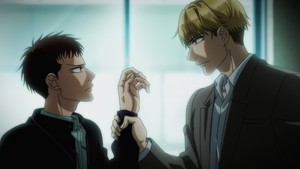The Night Beyond the Tricornered Window
Episode 9
by Rebecca Silverman,
How would you rate episode 9 of
The Night Beyond the Tricornered Window ?
Community score: 4.5

Bargains with death, or rather Death, aren't uncommon in world folklore. The best known tends to be the fairy tale Godfather Death, although that's not a true bargaining story for much of the tale. But the idea that you can somehow challenge Death to a game, a bet, anything – and get them to let go of the person they have in their grasp has roots in numerous mythologies, and just as many show that keeping that bargain is no easy feat. Whether you think of Godfather Death or the Greek myth of Orpheus and Eurydice, there's no denying that what Erika does this week as she brings Sakaki back from the brink is dangerous – especially since she might just be seducing Death by reminding them that there is no one they love more than Erika herself. But symbolically what she's doing is almost more important than just saving Sakaki's life: she sees herself as reclaiming that which is hers from someone who would take it away from her. In a literal sense, that someone would be Death, but symbolically the person she's rebelling against is Sensei, by whose hand and power Sakaki died.
Much of this episode dwells on the idea of what “belongs” to someone. Erika feels that Sensei is stealing her bodyguard/friend when he uses his power on Sakaki, so she takes him back. But even earlier than that Sensei felt that Mikado stole his happiness and safety from him, even though it is ultimately Sensei who made the conscious decision to give those things to his son voluntarily. He doesn't entirely know why Mikado's presence at the end of the episode upsets him so much, but he does recognize that he's been robbed of someone and perhaps something, and that tips him over the edge even further than he was already listing before – if he were a sailboat, he'd be heeling to the brink of capsizing. At this point he barely seems aware that he did this to himself; all that matters is that the curse has been eating away at his sanity for years until there's not a whole lot left. That may have set in soon after he left his family, since we see that he more or less consumed another three-person family unit in the past: two parents and a son, which seems far too symbolic of what he lost to disregard. More interesting is that he seems to feel that he was “saved” from his breakdown by the discovery of the hatred Hiyakawa left buried in the basement of where he used to live – hatred that has kept Sensei on just this side of sane for a while.
The problem is, as Hiyakawa sees it, that hatred isn't his to claim. It belongs to the child that Hiyakawa really still is inside, and while he may have left it behind, as his relationship with Mikado spirals out of his control it becomes something that he's more interested in reclaiming. As the show has gone on, it's become increasingly apparent that Hiyakawa is only grown up in body, and much of what has come off as unhealthy and controlling in an adult man is more likely a child's fervent wish to keep a favorite person all to themselves – and an inability to grasp why that's neither healthy nor possible. Hiyakawa's a Peter Pan figure, a boy whose growth just stopped, but his Neverland is entirely within his mind. He's been searching for a way to bind his shadow to him for years, and he thought he found it in Mikado. But when Mikado turned out not to be his shadow at all, but a separate person with his own free will and increasing understanding of his powers, Hiyakawa grew more and more upset. Now, when Mikado saves the powerless neighbor from Sensei's attack rather than Hiyakawa, he doesn't see it as a case of helping the person who can't save themselves – he views it as a betrayal by the person he had convinced himself belonged just to him. And like a selfish child, when he can't have something all to himself, his instinct is that no one should have it.
What waits beyond that tricornered window for Mikado? It seems likely that he'll just end up in the pond again, where the owner of the house seeks to hold on to what she feels is hers. But the real question is whether or not Mikado will try to save Hiyakawa – and if he does, whether he'll be more successful than Hanzawa was when he initially discovered a boy who had stopped growing up.
Rating:
The Night Beyond the Tricornered Window is currently streaming on Crunchyroll.
discuss this in the forum (37 posts) |
back to The Night Beyond the Tricornered Window
Episode Review homepage / archives